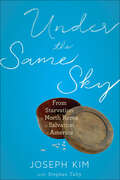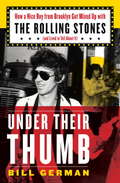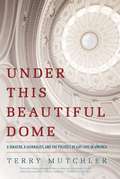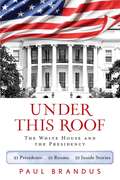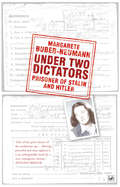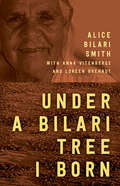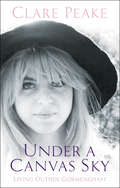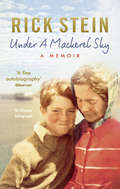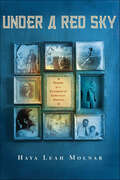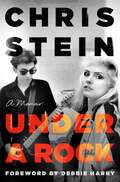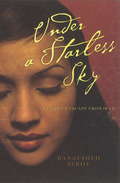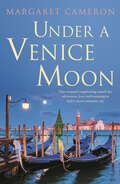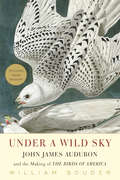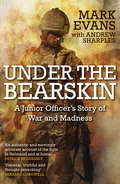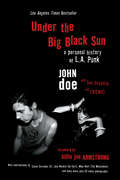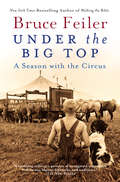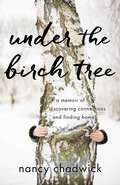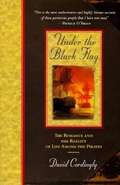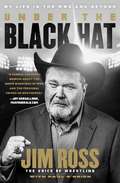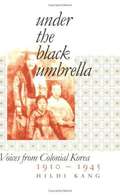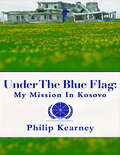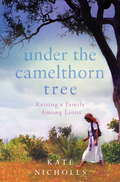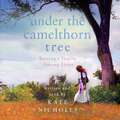- Table View
- List View
Under The Same Sky: From Starvation in North Korea to Salvation in America
by Stephan Talty Joseph KimIn this “courageous and inspiring memoir,” a young man recounts his escape from an impoverished childhood and adolescence in North Korea (Kirkus Reviews).Inside the hidden and mysterious world of North Korea, Joseph Kim lived a young boy’s normal life until he was five. Then disaster struck: the first wave of the Great Famine, a long, terrible ordeal that killed millions, including his father, and sent others, like his mother and only sister, on desperate escape routes into China. Alone on the streets, Joseph learned to beg and steal until finally, in desperation, he too crossed a frozen river to escape to China.A kindly Christian woman took him in and kept him hidden from the authorities. And through an underground network of activists, he was spirited to the American consulate, becoming one of only a very few North Koreans to be brought to the United States as refugees. Joseph knew no English and had never been a good student. Yet the kindness of his foster family changed his life. He became a dedicated student, mastered English, and made it to college, where he is now thriving thanks to his faith and inner strength. Under the Same Sky is an unforgettable story of suffering and redemption.
Under Their Thumb: How a Nice Boy from Brooklyn Got Mixed Up with the Rolling Stones (and Lived to Tell About It)
by Bill GermanIt's every rock 'n' roll fan's dream - to hang out with the band they love. But for Bill German it wasn't just a dream - it was a job. When 16 year old Bill German, up late in his pj's, put the finishing touches to the first issue of his Rolling Stones fanzine Beggars Banquet, little did he know he'd embarked on a rock odyssey that would take him from his tiny bedroom in Brooklyn into the inner sanctum of the greatest rock band in the world. Shyly pushing his crudely mimeographed newsletter into the hands of band members as they bundled into limos, personally delivering every issue to their New York office, little did he suspect the Stones were actually reading it. Yet they were - it was the only way they could keep tabs on each other - and suddenly the teenager found himself drawn into a heady world of after show parties, impromptu jam sessions, world tours, drug smuggling and late night heart-to-hearts. And there - between stops at Clapton's pad and the White House - he found a band profoundly uncertain of its future and constantly on the verge of break-up. Bill's memoir is a touching, naive, raucous, bittersweet journey from adolescence to mid-life crisis, but also the story of a band in transition. The 1980s saw the death of founder Stone Ian Stewart; the strains and rivalries of their burgeoning solo careers; and, with the launch of Steel Wheels in 1989, The Rolling Stones' final apotheosis from devil may care enfants terribles, to mature stadium rockers. Bill German saw it all and in Under Their Thumb he describes how he, Mick, Keith, Ron, Bill and Charlie finally came of age. And how a nice boy from Brooklyn played with fire and lived to tell the tale. www. BeggarsBanquetOnline. com
Under This Beautiful Dome: A Senator, A Journalist, and the Politics of Gay Love in America
by Terry Mutchler"One of the greatest love stories I have ever heard played out right here, under this beautiful dome. But it was a secret. . . . Penny and Terry just wanted what so many people want-to express their love through marriage."-Illinois Representative Ann WilliamsUnder This Beautiful Dome tells the true story of journalist Terry Mutchler's secret five-year relationship with Penny Severns, an Illinois State Senator who mentored Barack Obama. Forced to engage in an elaborate ruse to keep their relationship a secret, the two women constantly fear discovery in their conservative town. Denied legal access to the altar, they face even greater hardships when Penny is diagnosed with cancer and begins undergoing treatment.Set in the political arena, Under This Beautiful Dome reminds us why the march to legalize same-sex marriage is both personal and political. This vivid, beautiful story paints an intimate portrait of a loving relationship and the vast impact gay marriage legislation has on couples and families in America today.
Under This Roof: The White House and the Presidency--21 Presidents, 21 Rooms, 21 Inside Stories
by Paul Brandus“Like taking a tour of the White House with a gifted storyteller at your side!” <P><P>Why, in the minutes before John F. Kennedy was murdered, was a blood-red carpet installed in the Oval Office? If Abraham Lincoln never slept in the Lincoln Bedroom, where did he sleep? <P><P>Why was one president nearly killed in the White House on inauguration day—and another secretly sworn in? What really happened in the Situation Room on September 11, 2001? <P><P>History leaps off the page in this “riveting,” “fast-moving” and “highly entertaining” book on the presidency and White House in Under This Roof, from award-winning White House-based journalist Paul Brandus. Reporting from the West Wing briefing room since 2008, Brandus—the most followed White House journalist on Twitter (@WestWingReport)—weaves together stories of the presidents, their families, the events of their time—and an oft-ignored major character, the White House itself. <P><P>From George Washington—who selected the winning design for the White House—to the current occupant, Barack Obama—the story of the White House is the story of America itself, Brandus writes. You’ll: <P><P>Walk with John Adams through the still-unfinished mansion, and watch Thomas Jefferson plot to buy the Louisiana Territory <P><P>Feel the fear and panic as British invaders approach the mansion in 1814—and Dolley Madison frantically saves a painting of Washington <P><P>Gaze out the window with Abraham Lincoln as Confederate flags flutter in the breeze on the other side of the Potomac <P><P>Be in the room as one president is secretly sworn in, and another gambles away the White House china in a card game Stand by the presidential bed as one First Lady—covering up her husband’s illness from the nation—secretly makes decisions on his behalf <P><P>Learn how telephones, movies, radio, TV changed the presidency—and the nation itself <P><P>Through triumph and tragedy, boom and bust, secrets and scandals, Brandus takes you to the presidential bedroom, movie theater, Situation Room, Oval Office and more. Under This Roof is a “sensuous account of the history of both the home of the President, and the men and women who designed, inhabited, and decorated it. Paul Brandus captivates with surprising, gloriously raw observations.”
Under Two Dictators: With an introduction by Nikolaus Wachsmann
by Margarete Buber-NeumannThis book is a unique account by a survivor of both the Soviet and Nazi concentration camps: its author, Margarete Buber-Neumann, was a loyal member of the German Communist party. From 1935 she and her second husband, Heinz Neumann, were political refugees in Moscow. In April 1937 Neumann was arrested by the secret police, and executed by the end of the year. She herself was arrested in 1938. In Under Two Dictators Buber-Neumann describes the two years of suffering she endured in the Soviet prisons and in the huge Central-Asian concentration and slave labour camp of Karaganda; her extradition to the Gestapo in 1940 at the time of the Stalin-Hitler Friendship Pact; and her five years of suffering in the Nazi concentration and death camp for women, Ravensbrück. Her story displays extraordinary powers of observation and of memory as she describes her own fate, as well as those of hundreds of fellow prisoners. She explores the behaviour of the guards, supervisors, police and secret police and compares and contrasts Stalin and Hitler's methods of dictatorship and terror. First published in Swedish, German and English and subsequently translated and published in a further nine languages, Under Two Dictators is harrowing in its depiction of life under the rule of two of the most brutal regimes the western world has ever seen but also an inspiring story of survival, of ideology and of strength and a clarion call for the protection of democracy.
Under a Bilari Tree I Born
by Alice Bilari Smith Anna Vitenbergs Loreen BrehautBringing up nine children of your own is a major achievement in itself. Bringing up a further 15 foster children is truly remarkable. Alice Bilari Smith had lived in the Pilbara all her life, on stations and in the bush, on government reserves and in towns. As a girl on Rocklea Station she narrowly avoided removal from her family by "the Welfare." She grew up in the ways of her country, hunting, cooking, and building in the traditional manner. Some of her children were born in the bush, others in the hospital. By the time she had five children of her own she was playing an active role in caring for other Aboriginal children, and she initiated the establishment of the Homemakers Centre in Roebourne. Both a remarkable life and a typical life, Alice's story is insightful and inspiring.
Under a Canvas Sky: Living Outside Gormenghast
by Clare PeakeClare Peake, daughter of the celebrated writer and artist Mervyn Peake, tells the story of her parents' romance and her own happy and bohemian childhood.Mervyn Peake was born in China, the son of medical missionaries, and the juxtaposition of his exotic surroundings and the very English manners at home had a lasting effect on him. Reading Treasure Island until he could recite it by heart and waiting for comics to arrive from England had him living a childhood bursting with imagery.He returned to England to study at the Royal Academy School and was then offered a teaching post at Westminster School of Art. There his charismatic and un-worldly presence made a huge impact: none more so than on Maeve Gilmore, a seventeen-year-old sculpture student.The couple fell passionately in love but Maeve's parents were determined their daughter would not marry a penniless artist and sent her away to forget him. She didn't and, refusing to be parted ever again, they married when Maeve was nineteen and Mervyn twenty-six.Mervyn Peake developed Parkinson's disease aged forty-five.His decline was rapid and he spent time in and out of mental hospitals until his death at fifty-seven, the diagnosis never fully understood. Clare Peake writes movingly of the impact on the family and her mother's determination to continue giving her children the happiness she felt all children deserved.
Under a Mackerel Sky
by Rick Stein‘All men should strive to learn before they die what they are running from, and to, and why’Rick Stein's childhood in 1950s rural Oxfordshire and North Cornwall was idyllic. His parents were charming and gregarious, their five children much-loved and given freedom typical of the time. As he grew older, the holidays were filled with loud and lively parties in his parents' Cornish barn. But ever-present was the unpredicatible mood of his bipolar father, with Rick frequently the focus of his anger and sadness.When Rick was 18 his father killed himself. Emotionally adrift, Rick left for Australia, carrying a suitcase stamped with his father's initials. Manual labour in the outback followed by adventures in America and Mexico toughened up the naive public schoolboy, but at heart he was still lost and unsure what to do with his life.Eventually, Cornwall called him home. From the entrepreneurial days of his mobile disco, the Purple Tiger, to his first, unlikely unlikely nightclub where much of the time was spent breaking up drink-fuelled fights, Rick charts his personal journey in a way that is both wry and perceptive; engaging and witty.Shortlisted for the Specsavers National Book Awards 2013
Under a Pink Sky
by Esther GheyA MOTHER’S TRUE STORY OF LOVE, LOSS, THE POWER OF FORGIVENESS & THE FIGHT TO PROTECT OUR CHILDREN’S FUTURES IN THE DIGITAL AGE.'Remarkable' Daily Mail'Remarkable…really honest' Lorraine Kelly'A very powerful and very moving book' Anita Rani, Woman's Hour'One of the most unflinching, inspirational autobiographies I’ve read, a remarkable cry of hope from the depths of despair' GuardianOn 11 February 2023, 16-year-old Brianna Ghey left home to meet her friend in a park local to her home in Warrington, Cheshire. Her mother, Esther, was relieved to see her go – a positive step after a difficult and increasingly isolated few years. What Esther didn’t know that day was that Brianna was being lured to the park where she would be tragically murdered.There was at once an international outpouring of anguish and outrage for a young life brutally snatched away and a mother’s worst nightmare come true. Amidst global displays of support, the usually shy and private Esther began to reflect on how she could channel her own personal grief into campaigning to help others and to create a lasting legacy for her child.This is the story of Brianna’s death, but it is also the story of her life and of a mother who had to find a way to survive without her. It is a story of transforming unimaginable tragedy into change, of the power of empathy, and a call for understanding and unity in the face of the threats our young people face in an increasingly unchecked digital world.This is Esther’s fight for a safer, more hopeful future.
Under a Red Sky: Memoir of a Childhood in Communist Romania
by Haya Leah MolnarEva Zimmermann is eight years old, and she has just discovered she is Jewish. Such is the life of an only child living in postwar Bucharest, a city that is changing in ever more frightening ways. Eva's family, full of eccentric and opinionated adults, will do absolutely anything to keep her safe—even if it means hiding her identity from her. With razor-sharp depictions of her animated relatives, Haya Leah Molnar's memoir of her childhood captures with touching precocity the very adult realities of living behind the iron curtain.Under a Red Sky is a 2011 Bank Street - Best Children's Book of the Year.
Under a Rock: A Memoir
by Chris SteinForeword by Debbie Harry"A Downtown Memory" by Romy AshbyDebbie Harry defined iconic band Blondie’s look. Chris Stein—her performing partner, lover, and lifelong friend—was its architect and defined its sound. “Parallel Lines”, their third album, catapulted to #1, sold 20 million copies, and launched singles like “Heart of Glass”, "Hangin' On the Telephone," and “One Way or Another”, providing the beat when Bianca Jagger and Halston danced at Studio 54 and the soundtrack to every 1970’s punk-soundtracked romance. Chris Stein knows how to tell a story. Under A Rock is his nothing-spared autobiography. It's about the founding of the band, ascending to the heights of pop success, and the hazards of fortune.Famous names march through these pages—Warhol, Bowie, Jean-Michel Basquiat, and more–but you can get famous names anywhere. What you can’t get anywhere else is a plunge into the moments that made a giant 1980's artistic sensation. Stein takes us there in this revelatory, propulsive, distinctive memoir.
Under a Starless Sky: A family's escape from Iran
by Banafsheh SerovOne family's journey through the turmoil of the 1978 revolution, when the Ayatollah Khomeini came to power in Iran, and their escape over the mountains to Turkey, and ultimately to Australia. Banafsheh is eight when the revolution begins in Iran. At first her family are jubilant about the collapse of the Shah's rule and the return of Ayatollah Khomeini, but they quickly realise that Iran has traded one dictator for another, more ruthless, ruler. Banafsheh's parents, Kamal and Nina, struggle with the harsh laws of the new revolutionary Iran. Khomeini's revolutionary guard, the Komiteh, patrol the streets, enforcing Islamic codes of dress and behaviour, and dispatching harsh justice to perceived enemies of the revolution. They drag Nina's father in for questioning, interrogate Nina and put Kamal on a stop-list, so he is unable to leave the country. Fearing for the safety of their two children, Kamal and Nina decide the family must flee their beloved country, leaving behind their extended family and friends. But the only way of escape is to take the dangerous route across the Turkish mountains.
Under a Venice Moon
by Margaret CameronLife isn't a sort of practice run, something you can afford to play around with. They don't offer second and third chances to get it right. Use it better. Live it fuller.A week in Venice ignites Margaret Cameron's interest in the private city behind the tourist facade and the obscure tales from its history. Tantalised by stories of this lesser-known Venice she returns the following August for a month-long stay, determined to uncover the Venice of the Venetians.Stepping out from her comfort zone, Margaret finds that friendships - unexpected and spontaneous - blossom within palazzi walls and she makes a discovery: life can lead you along rewarding paths, if you let it.As each day passes, her time in Venice becomes more than just an interlude; soon, the city feels like home. Could she leave her satisfying life in Perth and start anew in Venice? The question becomes urgent when romance waits where she least expected to find it . . .
Under a Wild Sky: John James Audubon and the Making of The Birds of America
by William SouderJohn James Audubon is renowned for his masterpiece of natural history and art, The Birds of America, the first nearly comprehensive survey of the continent's birdlife. And yet few people understand, and many assume incorrectly, what sort of man he was. How did the illegitimate son of a French sea captain living in Haiti, who lied both about his parentage and his training, rise to become one of the greatest natural historians ever and the greatest name in ornithology? In Under a Wild Sky this Pulitzer Prize finalist, William Souder reveals that Audubon did not only compose the most famous depictions of birds the world has ever seen, he also composed a brilliant mythology of self. In this dazzling work of biography, Souder charts the life of a driven man who, despite all odds, became the historical figure we know today.
Under a Wing
by Reeve LindberghMemoir of Anne Morrow Lindbergh and Charles Lindbergh's family written by their youngest daughter.
Under the Bearskin: A junior officer’s story of war and madness
by Mark Evans Andrew Sharples'A fast-paced, thrilling account of British heroism, brave men surrounded and fighting against overwhelming odds. This is the real, sometimes shocking, and deeply personal story of modern warfare and PTSD.' Andy McNab'This hugely timely book reveals in gripping detail the personal stories of its hidden victims - lest we forget.' Damien LewisTrapped in an isolated outpost on the edge of the Helmand desert, a small force of British and Afghan soldiers is holding out against hundreds of Taliban fighters. Under brutal siege conditions, running low on food and ammunition, he experiences the full horror of combat. As the casualties begin to mount and the enemy closes in, Evans finds both his leadership and his belief in the war severely tested. Returning home, he is haunted by the memories of Afghanistan. He can't move on and his life begins to spin out of control.Under the Bearskin was previously published as Code Black.
Under the Big Black Sun: A Personal History Of L. A. Punk
by John Doe Tom DesaviaUnder the Big Black Sun explores the nascent Los Angeles punk rock movement and its evolution to hardcore punk as it's never been told before. Authors John Doe and Tom DeSavia have woven together an enthralling story of the legendary west coast scene from 1977-1982 by enlisting the voices of people who were there. The book shares chapter-length tales from the authors along with personal essays from famous (and infamous) players in the scene. Additional authors include: Exene Cervenka (X), Henry Rollins (Black Flag), Mike Watt (The Minutemen), Jane Wiedlin and Charlotte Caffey (The Go-Go's), Dave Alvin (The Blasters), Jack Grisham (TSOL), Teresa Covarrubias (The Brat), Robert Lopez (The Zeros, El Vez), as well as scencesters and journalists Pleasant Gehman, Kristine McKenna, and Chris Morris. Through interstitial commentary, John Doe "narrates" this journey through the land of film noir sunshine, Hollywood back alleys, and suburban sprawl-the place where he met his artistic counterparts Exene, DJ Bonebrake, and Billy Zoom-and formed X, the band that became synonymous with, and in many ways defined, L.A. punk. Under the Big Black Sun shares stories of friendship and love, ambition and feuds, grandiose dreams and cultural rage, all combined with the tattered, glossy sheen of pop culture weirdness that epitomized the operations of Hollywood's underbelly. Readers will travel to the clubs that defined the scene, as well as to the street corners, empty lots, apartment complexes, and squats that served as de facto salons for the musicians, artists, and fringe players that hashed out what would become punk rock in Los Angeles.
Under the Big Top
by Bruce FeilerBoth a great American adventure and a rare entry into asheltered world, Under the Big Top describes one man's pursuit of every child's fantasy: running away to join the circus. Bruce Feiler's unforgettable year as a clown will forever change your view of one of the world's oldest art forms and remind you of how dreams can go horribly wrong -- and then miraculously come true.
Under the Birch Tree: A Memoir of Discovering Connections and Finding Home
by Nancy ChadwickA birch tree grows tall and arabesque in the front yard of Nancy Chadwick&’s childhood home. Over time the tree becomes her buddy and first learned connection, synonymous with home—and one spring morning, she makes a discovery under its boughs that foreshadows the many disconnections within her family, relationships, jobs, and home that are to come. Through the chapters in her life, Chadwick&’s search for home carries her through with unflinching honesty, but in the end, it is a story of survival and triumph over adversity. She does not wallow in self-pity but remains tenacious as she examines her life. An exploration of what it means to belong, Under the Birch Tree is a success story of finding home.
Under the Black Flag: The Romance and the Reality of Life Among the Pirates
by David CordinglyFor this rousing, revisionist history, the former head of exhibitions at England's National Maritime Museum has combed original documents and records to produce a most authoritative and definitive account of piracy's "Golden Age." As he explodes many accepted myths (i. e. "walking the plank" is pure fiction), Cordingly replaces them with a truth that is more complex and often bloodier.
Under the Black Hat: My Life in the WWE and Beyond
by Paul O'Brien Jim RossFrom legendary wrestling announcer Jim Ross comes a candid, colorful memoir about the inner workings of the WWE and the personal crises he weathered at the height of his career.If you&’ve caught a televised wrestling match anytime in the past THIRTY years, you&’ve probably heard Jim Ross&’s throaty Oklahoma twang. The beloved longtime announcer of WWE is already an icon to generations of wrestling fans, and he&’s not slowing down, having just signed on as the announcer of the starry new wrestling venture All Elite Wrestling. In this follow-up to his bestselling memoir Slobberknocker, he dishes about not only his long career, which includes nurturing global stars like Stone Cold Steve Austin, The Rock, and John Cena, but also about the challenges of aging and disability, his split from collaborator Vince McMahon, and the sudden death of his beloved wife, Jan. The result is a gruff, endearing, and remarkably human-scale portrait, set against the larger-than-life backdrop of professional wrestling. Ross&’s ascent in WWE mirrors the rise of professional wrestling itself from a DIY sideshow to a billion-dollar business. Under the Black Hat traces all the highs and lows of that wild ride, in which Jim served not only as on-air commentator, but talent manager, payroll master, and even occasional in-ring foil to threats like Paul &“Triple H&” Levesque and Undertaker. While his role brought him riches and exposure Jim never dreamed of growing up in a small town in Oklahoma, he chafed against the strictures of a fickle corporate culture and what he saw as a narrow vision of what makes great wrestlers—and great story lines. When suddenly stricken with Bell&’s palsy, a form of facial paralysis that makes it impossible to smile, he stared down his greatest fear—being cast out of the announcing booth for good. Picking up where Slobberknocker left off and ending on the cusp of a new career in a reimagined industry, Under the Black Hat is the triumphant tale of a country boy who made it to the top, took a few knocks, and stuck around—just where his fans like him.
Under the Black Umbrella: Voices from Colonial Korea, 1910-1945
by Hildi KangIn the rich and varied life stories in Under the Black Umbrella, elderly Koreans recall incidents that illustrate the complexities of Korea during the colonial period. Hildi Kang here reinvigorates a period of Korean history long shrouded in the silence of those who endured under the "black umbrella" of Japanese colonial rule. Existing descriptions of the colonial period tend to focus on extremes: imperial repression and national resistance, Japanese subjugation and Korean suffering, Korean backwardness and Japanese progress. "Most people," Kang says, "have read or heard only the horror stories which, although true, tell only a small segment of colonial life. "The varied accounts in Under the Black Umbrella reveal a truth that is both more ambiguous and more human the small-scale, mundane realities of life in colonial Korea. Accessible and attractive narratives, linked by brief historical overviews, provide a large and fully textured view of Korea under Japanese rule. Looking past racial hatred and repression, Kang reveals small acts of resistance carried out by Koreans, as well as gestures of fairness by Japanese colonizers. Impressive for the history it recovers and preserves, Under the Black Umbrella is a candid, human account of a complicated time in a contested place.
Under the Blue Flag: My Mission in Kosovo
by Philip KearneySeeking to escape the monotony of his job as assistant District Attorney in San Francisco, Philip Kearney needed a change. His solution came one day in a casual email from a friend: “ U.N. has opening here for an international prosecutor doing war crimes stuff. You should apply.” “ Here” meant Pristina, Kosovo, and "stuff" Kearney soon found out— after landing the job despite his inexperience with international law and an inability to speak any foreign languages— meant a harrowing string of investigations involving the most brutal and devastating crimes imaginable. Abruptly removed from the comforts of home and the order and stability of America's justice system, Kearney found himself the sole international prosecutor assigned to a region of nearly one million people. Under the Blue Flag reads like an international legal thriller as Kearney and his colleagues are shuttled in armored vehicles between crime scenes and the makeshift courtrooms where Kosovo's fledgling legal system is tested daily. In the face of almost insurmountable obstacles— witness intimidation, corrupt law enforcement, and deep ethnic biases— the truth is slowly revealed. And with the truth emerges a cast of conflict-weary locals and displaced internationals, many of whom come to represent the war's most courageous and unheralded heroes. Under the Blue Flag is a passionate and eye-opening look at a post-war Kosovo that continues to straddle the stubborn gap between a past corrupted by violence and injustice and a future governed by the rule of law.
Under the Camelthorn Tree: The Impact of Trauma on One Family
by Kate NichollsKate Nicholls left England to raise her five children in Botswana: an experience that would change each of their lives. Living on a shoestring in a lion conservation camp, Kate home-schools her family under a camelthorn tree while they also learn at first hand about the individual lives of wild lions. Their deep attachment to these magnificent animals is palpable.This contemporary, gritty and humorous memoir explores the shocking impact of PTSD on a close-knit family, and their eventual recovery. It is a timely book that shines a light on an aspect of sexual crime that is often shrouded in shame: children of parents with PTSD can suffer collateral damage. The character-driven narrative moves effectively across time and place, revealing the gradual fragmentation of a strong woman. Kate Nicholls pulls no punches and her passion to act as advocate for the secondary victims of trauma is expressed in raw, unsentimental prose. She skilfully counterbalances this with amusing insight into family life. She explores the universal challenges of child-rearing with wit and engaging honesty, offering an unsanitised insight into raising a family in the African bush. Kate Nicholls' tightly constructed narrative has received widespread praise and she made a much-acclaimed appearance at the Hay Festival with Jane Garvey in May 2019.
Under the Camelthorn Tree: The Impact of Trauma on One Family
by Kate NichollsKate Nicholls left England to raise her five children in Botswana: an experience that would change each of their lives. Living on a shoestring in a lion conservation camp, Kate home-schools her family while they also learn at first hand about the individual lives of wild lions. Their deep attachment to these magnificent animals is palpable.The setting is exotic but it is also precarious. When the author is subjected to a brutal attack by three men, it threatens to destroy her and her family: post-traumatic stress turns a good mother into a woman who is fragmented and out of control. In this powerfully written, raw and often warmly funny memoir, we witness the devastation of living with a mother whose resilience is almost broken, and how familial structures shift as the children mature and roles change. Under the CamelthornTree addresses head-on the many issues surrounding motherhood, education, independence, and the natural world; and highlights the long-lasting effect of gender violence on secondary victims. Above all, it is an inspiring account of family love, and a powerful beacon of hope for life after trauma.
